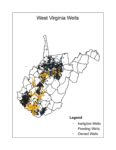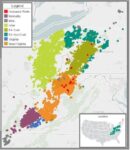|
|||||||||||
|
West Virginia used to have only 1oil and gas inspector for every 4000 oil and gas wells! And there are 75,000 wells and more than 20,000 associated tanks. During that time a study by Princeton and McGill universities found that a sample of 79 active, conventional, vertical wells in 13 counties was leaking an average of 9 cubic feet of gas – per hour. That is plain wasteful. If the leak is before the meter, the leak gyps royalty owners and severance tax collection. It often literally stinks. And oh yes it contributes to climate change. Due to legislative inaction we now only have 1 oil and gas inspector for every 8000 wells – twice as many wells per injector as before when all those leaks were measured! West Virginia ought to have 1 inspector for every 2000 wells. SB 480 which passed the Senate and is now in House finance (single committee reference) will put a mere $100 fee on wells grossing at least $10,000 a year. Incredibly, the industry calls that “onerous”! And that will only get us back to 1 inspector for 4000 wells, when all that leaking was measured. We need 28 additionial inspectors to routinely inspesct every well only once every 5 years. At least for now we need 1 inspector for every 2000 wells! Either: -SB 480 needs amended to add a fee of $50 on every active well (after all, it costs citizens $51 a year to register their cars), or -3% of the proceeds of the 5% severance tax needs dedicated to the fund for these inspectors as in SB 613 (but it needs amended up from 1.5%). Action Needed! Contact the members of the House Finance Committee and contact your legislators and tell them you want 1 inspector for 2000 wells, and to either put a fee of $50 on every active well, or change the bill to dedicate 3% of the 5% severance tax to the Office of Oil and Gas fund 3323 for these inspectors. Background: The Office of Oil and Gas is the only program of the DEP that does not get federal money (except for new federal money that can be used only to plug orphaned wells). The Office of Oil and Gas only charges well drillers a one time permit application fee – just one fee for the life of the well. The air, water and all other programs in DEP get paid an annual fee – every year. Because one new Marcellus well produces 60 times the gas of a conventional well, the income of the Office of Oil and Gas from the one time permit application fee funding has fallen way off. In the 2020 budget the Office of Oil and Gas got $4.8 million and had 17 inspectors. In 2021 its budget was cut to $3.4 Million and there are now only 9 inspectors. The Governor’s budget only had the same $3.4 million for 2022. Most of an inspectors work on a well occurs in the first year when it is drilled – checking out the erosion and sediment control plan in the permit application, making sure the casing is property cemented through groundwater and coal etc. But there is still inspection work that needs to be done for the 50 or even 100 years of the life of the well – maintaining well roads on farmers and, as Princeton and McGill found, looking for leaks. The head of the Office of Oil and Gas has said he has enough inspectors to deal with permit applications and complaints. But it is apparent they are doing few if any random inspections. And we do not think complaints are dealt with in a way that is a deterrent to drillers with problems. More inspectors are needed to keep level with oversight of other DEP programs. |
|||||||||||
WV Surface Owners' Rights Organization © 2016
Frontier Theme










